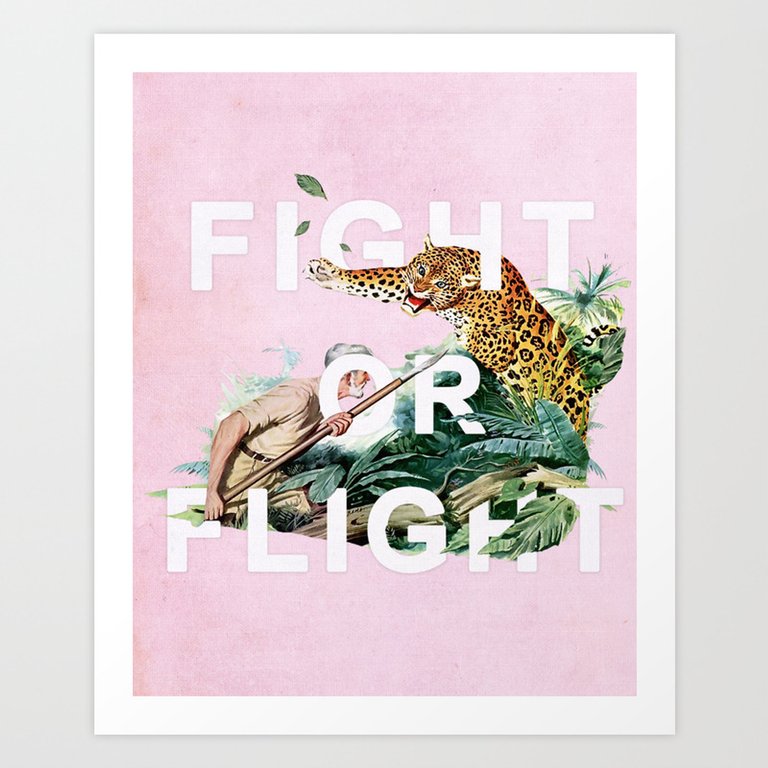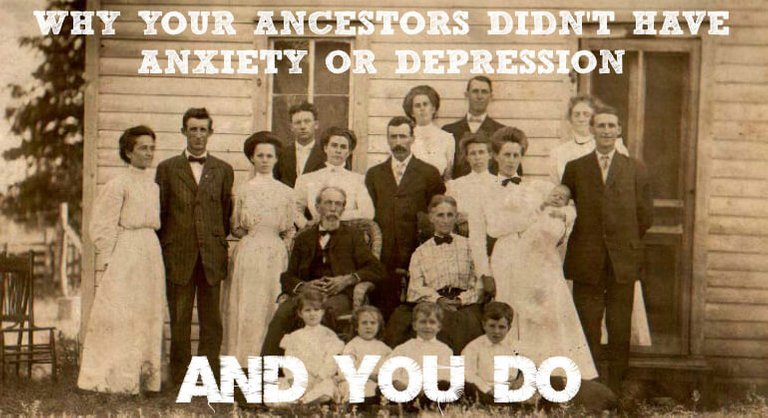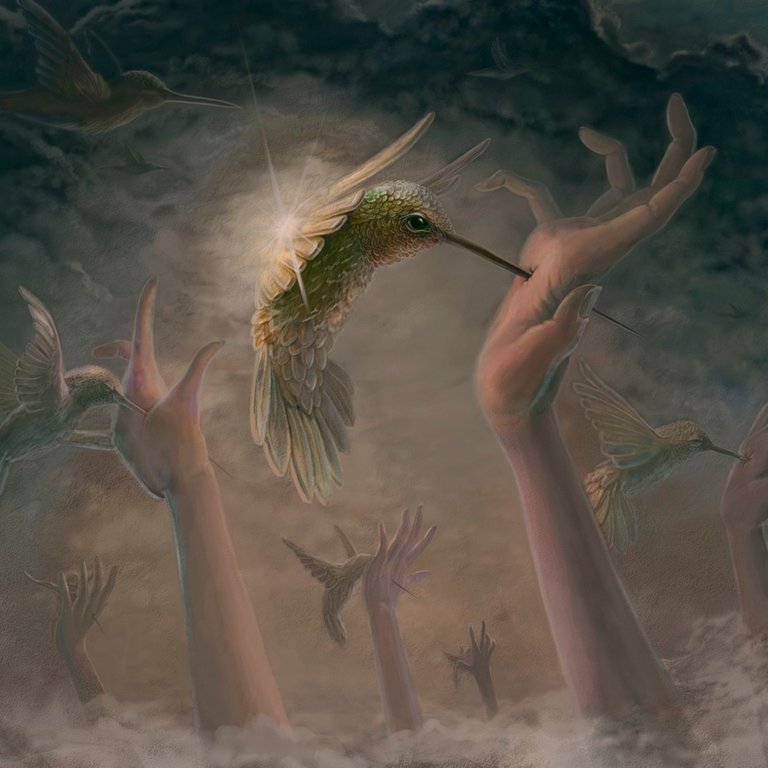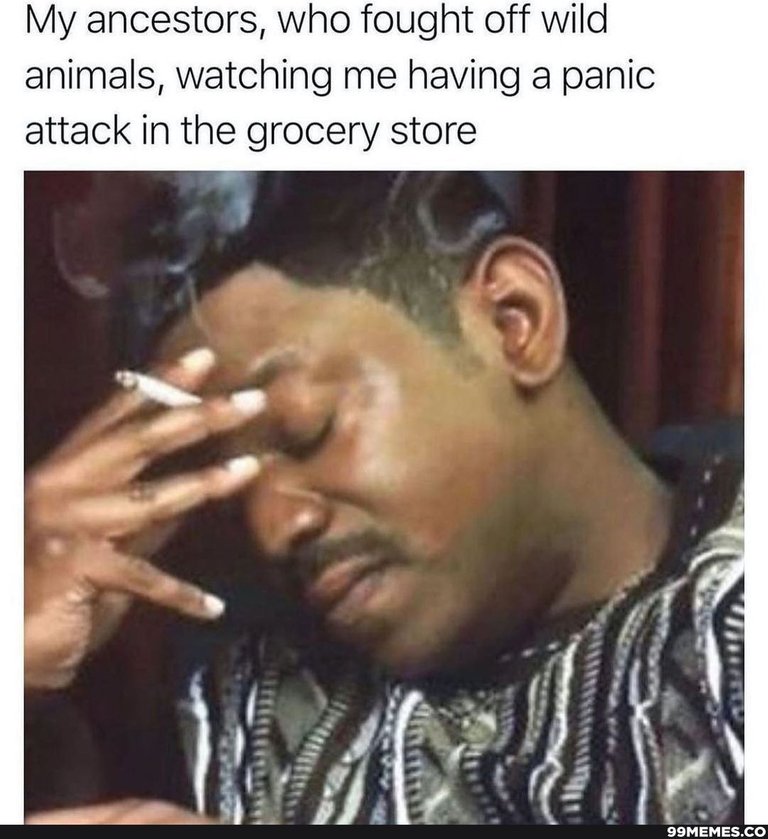The subversion of anxiety today // A subversão da ansiedade em nossa atualidade
I've been thinking about the evolution of society and anxiety. I have been wondering how our ancestors lived their journey on earth in a time quite different from ours. Mainly in terms of social differences. After all, the number of stimuli and worries seems smaller when we look back here, right? But it seems that is not quite the question.

Source
It is no longer news that the anxiety mechanism has evolved with us from our versions prior to homo sapiens, as a security alert, not just to be ready to fight or flee danger (the famous fight or flight mechanism ), but also to create anxious memories of certain patterns and possible events, such as: -This region is dangerous and may have tigers. Which was making us cautious. So far so good. But we are well aware that this mechanism is much more complex than that, and that currently it triggers through the most absurd situations or many times, without any situation.

Maybe it's because, due to their culture and manner of education, they didn't reveal the anguish and internal pain, it was not common for people to open up in the same way they open up today to talk about their feelings, but that doesn't mean they didn't felt
Source
Researching about the topic to write, I found a very good sentence that helped me to think better about this problem: - Anxiety is the reaction to a future loss. There are many themes that would be right triggers to exemplify this, like thinking about death itself (which will happen one day, for all of us), for some it's something more peaceful and gentle, for others it's heavy and scary and for different reasons. Reacting to inaccurate assumptions about the future is a classic anxiety-generating pattern, yet this mechanism is a distorted and problematic version of the healthy and necessary mechanism of care and alert that has protected us for many years.

Source
In the course of evolution, man continued to face dangers, and increasingly linked to the social and less linked to the natural, since before the periods of slavery (which, imagine how terribly stressful it was), going through phases of invasion of territories, wars, famine, pestilence, and so on. Man's nature is to be on the alert. But still I insist that our current society is more predisposed to generate anxiety because of the number of stimuli and triggers it delivers per minute, almost in a chaotic and absurd spiral of information, much of which is not only unnecessary and useless, but literally harmful.

Source
I'm not saying that we suffer more than our ancestors, I'm just saying that we are more predisposed and fragile to face poisonous levels of anxiety and that they generate nothing but our own wear and tear and slowly destroy. I've spent a lot of time studying biochemical and pharmacological issues to understand possible imbalances that exist and can lead to this type of anxious state, but I realize little by little that at least 50% of the problem is external, more specifically socio-cultural, and it comes of our construction. Not only because of our childhood phase, where it absorbs and organizes the initial worldview, but also because of the countless pressures and aggravations that arise in the course of our journey.

Source
I still need a lot to understand what can be done about it, besides the obvious (but which sometimes escapes us), how to reduce anxious stimuli such as "poisonous social networks", filter the type of content you are absorbing, improve the habits that are good for you and cut out those that are bad, avoid certain harmful stimulant foods: such as glutamate, caffeine, sugar, etc. And so on. But at the same time we are in a kind of paradox, because, as we well know, isolation does not necessarily generate a solution, an isolated person will not necessarily be peaceful, it can even be worse for their sanity. It has a lot to do with an internal transformation and a resistance, resilience, reinforcement, maturation of how it faces the world and how it stops being affected by what does not deserve its affectation.
Thômas Helon Blum

Português
Estive pensando sobre a evolução da sociedade e a ansiedade. Tenho me perguntado sobre como nossos antepassados viviam sua jornada na terra numa época bem diferente da nossa. Principalmente em termos de diferenças sociais mesmo. Afinal, o número de estímulos e preocupações parece menor quando olhamos daqui para o passado, correto? Mas parece que não é bem essa a questão.

Source
Já não é novidade o fato de que o mecanismo de ansiedade evoluiu junto conosco desde de nossas versões anteriores ao homo sapiens, como sendo um alerta de segurança, não apenas para estar pronto para lutar ou fugir do perigo (o famoso mecanismo de fuga ou luta), mas também para criar memórias ansiosas de determinados padrões e possíveis acontecimentos, como por exemplo: -Essa região é perigosa e pode ter tigres. O que foi nos deixando precavidos. Até aí tudo bem. Mas sabemos bem que esse mecanismo é muito mais complexo do que isso, e que atualmente ele dispara pelas mais absurdas situações ou muitas vezes, sem nenhuma situação.

Talvez seja por que devido a sua cultura e modo de educação, eles não revelavam as angustias e dores internas, não era comum as pessoas se abrirem da mesma forma que se abrem hoje para falar de seus sentimentos, mas isso não quer dizer que não sentiam
Source
Pesquisando sobre o tema para escrever, encontrei uma frase muito boa que me ajudou a pensar melhor sobre esse problema: - A ansiedade é a reação a uma perda futura. Existem muitos temas que seriam gatilhos certos para exemplificar isso, como pensar na própria morte (que um dia vai acontecer, para todos nós), para alguns é algo mais tranquilo e suave, para outros é pesado e assustador e por diferentes motivos. Reagir a hipóteses inexatas do futuro é um padrão clássico gerador de ansiedades, ainda que esse mecanismo seja uma versão desvirtuada e problemática do mecanismo saudável e necessário de cuidado e alerta que nos protegeu por muitos anos.

Source
No passar da evolução o homem seguiu enfrentando perigos, e cada vez mais ligados ao social e menos ligados ao natural, desde antes dos períodos de escravidão (que, imaginem o quão terrivelmente estressante foi), passando por fases de invasões de territórios, guerras, fome, pestes, e assim por diante. A natureza do homem é estar em alerta. Mas ainda assim eu insisto em dizer que nossa sociedade atual é mais predisposta a gerar ansiedade pelo número de estímulos e gatilhos que nos entrega por minuto, quase que num espiral caótico e absurdo de informações, muitas das quais não apenas desnecessárias e inúteis, mas literalmente nocivas.

Source
Não estou dizendo que sofremos mais que nossos antepassados, apenas dizendo que estamos mais predispostos e fragilizados a enfrentar níveis venenosos de ansiedade e que nada geram a não ser nosso próprio desgaste e destruição lentamente. Tenho passado um bom tempo estudando questões bioquímicas e farmacológicas para entender possíveis desequilíbrios que existem e podem nos levar a esse tipo de estado ansioso, mas percebo pouco a pouco que ao menos 50% do problema é externo, mais especificamente socio-cultural, e vem de nossa construção. Não apenas pela nossa fase infantil onde absorve e organiza a visão de mundo inicial mas também pelas inúmeras pressões e agravamentos que vão surgindo no desenrolar de nossa jornada.

Source
Falta-me ainda muito para compreender o que se pode fazer à respeito, além do óbvio (mas que nos foge as vezes), como diminuir os estímulos ansiosos como "redes sociais venenosas", filtrar o tipo de conteúdo que está absorvendo, melhorar os hábitos que lhe fazem bem e cortar os que fazem mal, evitar determinados alimentos estimulantes nocivos: como glutamato, cafeína, açúcar, etc. E assim por diante. Mas ao mesmo tempo ficamos em uma espécie de paradoxo, por que como bem sabemos o isolamento não gera necessariamente uma solução, uma pessoa isolada não será necessariamente tranquila, pode ser inclusive pior para a sua sanidade. Tem muito a ver com uma transformação interna e uma resistência, resiliência, reforço, maturação de como enfrenta o mundo e como deixa de ser afetado por aquilo que não merece sua afetação.
Thanks for your contribution to the STEMsocial community. Feel free to join us on discord to get to know the rest of us!
Please consider delegating to the @stemsocial account (80% of the curation rewards are returned).
Please consider including @stemsocial as a beneficiary to get a stronger support.